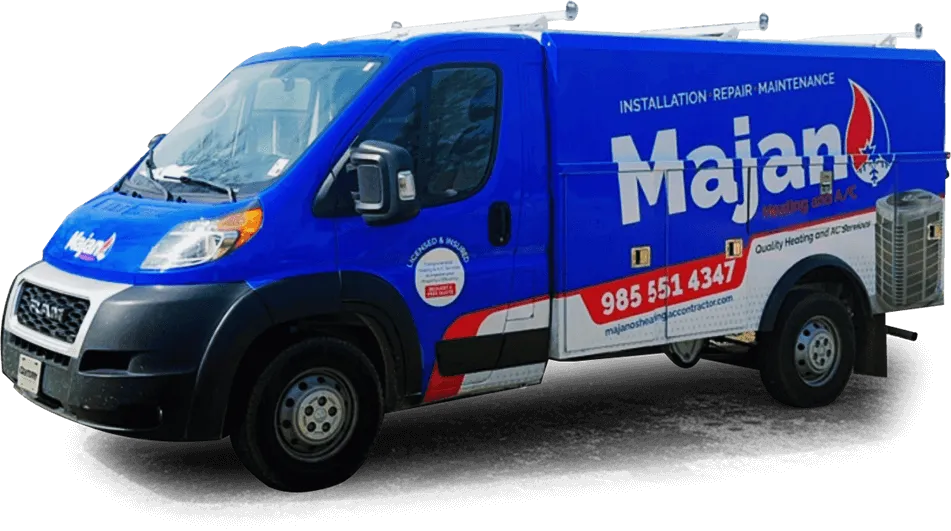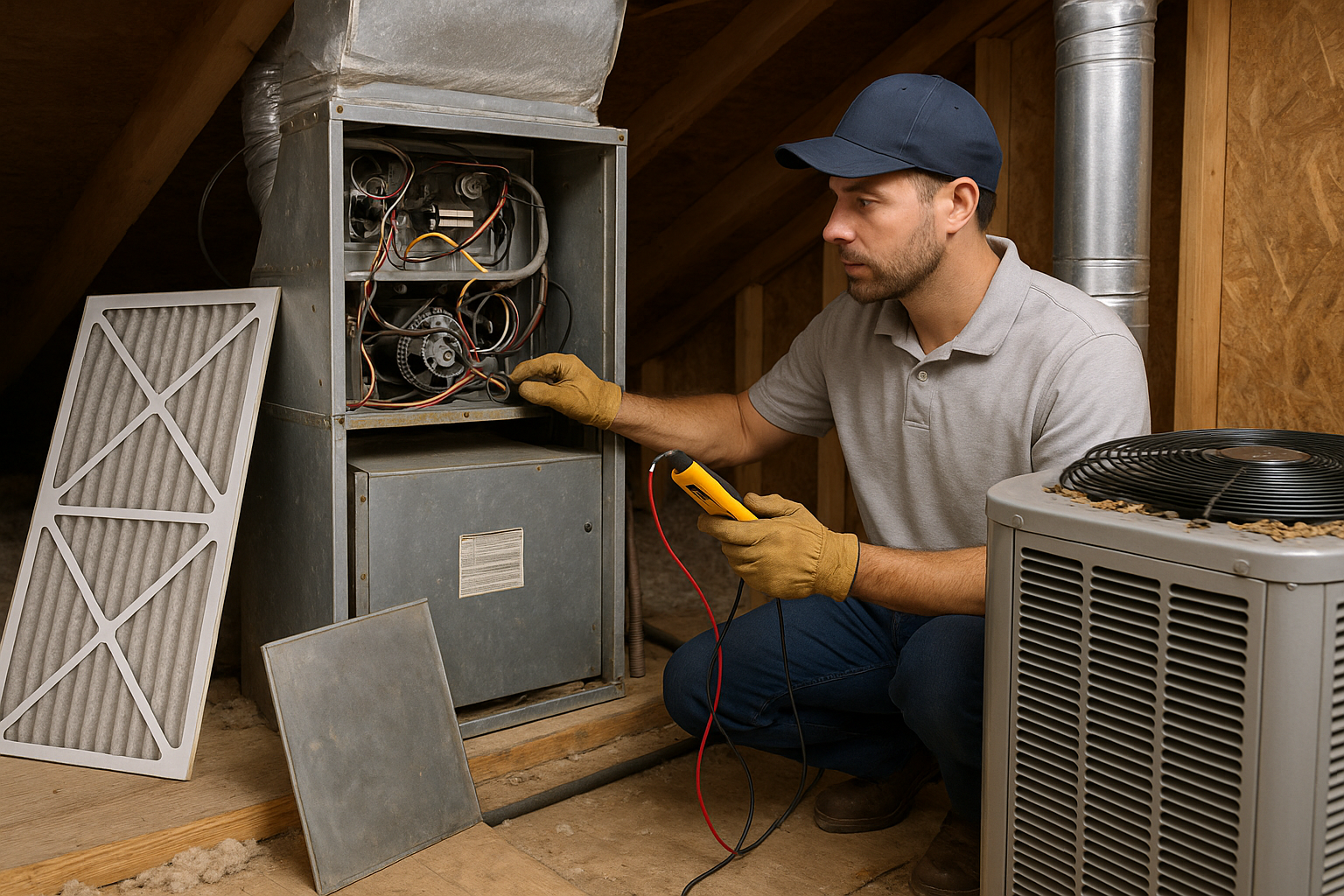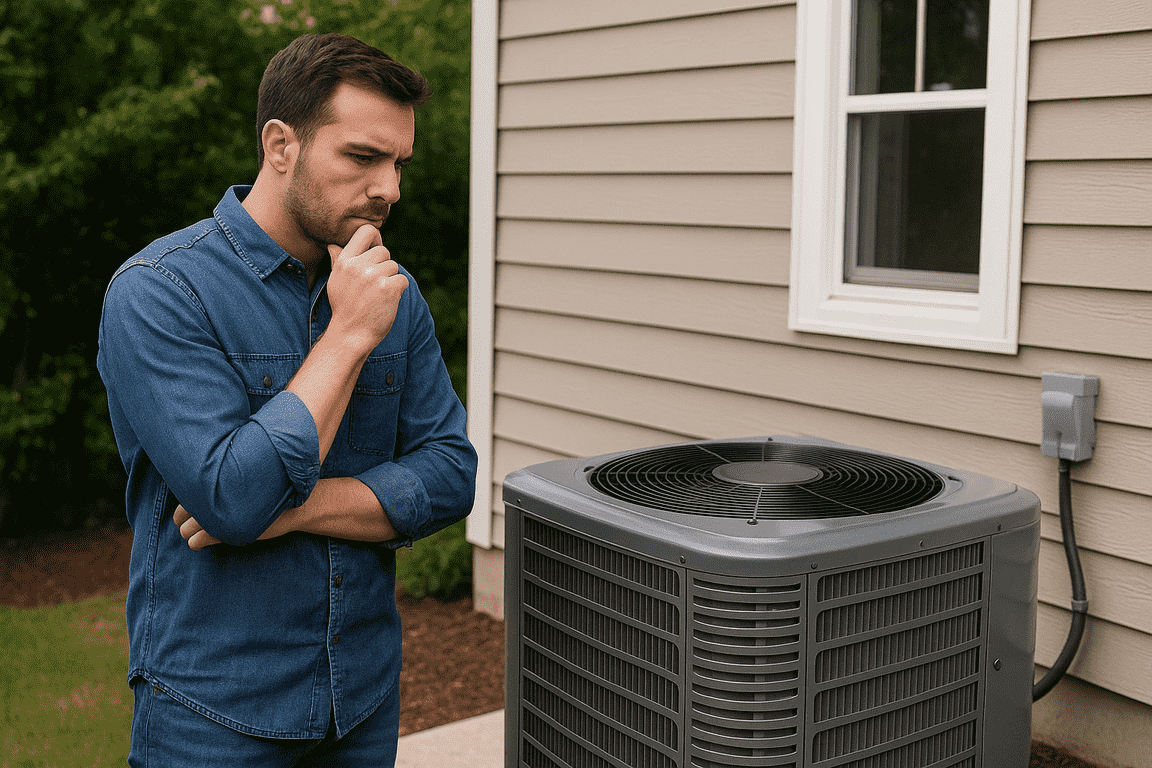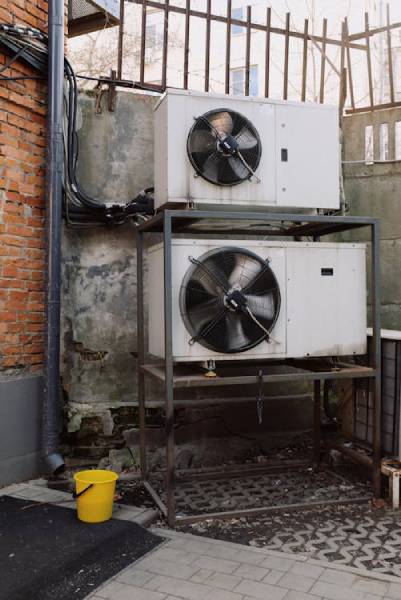September 30, 2024
How to Know When Your HVAC System Needs Repair or Replacement
Heating and cooling systems are essential for maintain a comfortable home, but like any appliance, they have a limited lifespan. In the U.S., the average HVAC system lasts between 10 to 15 years.
So, when problems arise, it’s natural to ask: Should I repair the issue, or is it time for a full replacement? Understanding when to choose an affordable HVAC repair and when to invest in a new system can help you avoid frequent service calls and high energy bills.
Let’s look at the signs that indicate whether a repair or replacement is the smarter choice for your HVAC unit.
1. Frequent Repairs vs. One-Time Fixes
One of the first signs that your HVAC system may need more than just a repair is the frequency of service calls. If you’ve had to call HVAC contractors multiple times in the last year for air conditioning repairs or heating service, it might be time to assess the overall condition of the system.
- Minor Fixes: If your unit is relatively young and requires small repairs like a clogged filter, faulty thermostat, or refrigerant refill, then these are one-time fixes that shouldn’t break the bank.
- Major Overhauls: On the other hand, if your system has required several major repairs like compressor failure, coil leaks, or blower motor issues, the cost of ongoing repairs can add up. In this case, replacement might be the more cost-efficient solution.
2. Age of the System Matters
The age of your HVAC system plays a huge role in determining if it’s worth fixing or replacing. If your unit is 10 to 15 years old, it’s likely nearing the end of its useful life.
- Older Units: Older systems become less efficient, costing more in both repairs and monthly energy bills. At this point, HVAC installationof a new system is often the better financial decision.
- Newer Systems: If your system is less than 10 years old, even larger repairs can often be justified, as newer models tend to be more efficient and cheaper to maintain in the long run.
3. Increasing Energy Bills
A clear sign that your HVAC system may need a replacement is a sudden increase in energy bills. Older systems lose efficiency, requiring more energy to maintain the same level of heating or cooling.
- Inefficient System: If your energy bills keep rising despite routine AC repairand reliable AC maintenance, the inefficiency may lie in the unit itself. Upgrading to a newer model can lower your bills significantly by using energy more efficiently.
- Energy-Efficient Models: Many modern HVACsystems are equipped with better technologies. Expert heating and cooling professionals can recommend models that fit your home’s needs while cutting down utility costs.
4. Inconsistent Temperatures
If you’ve noticed that certain rooms in your house are always too hot or too cold, it could mean that your HVAC system is struggling to distribute air evenly. Uneven temperatures usually indicate:
- Ductwork Problems: These can often be fixed with affordable HVAC repairor duct sealing services.
- System Wear: However, inconsistent heating and cooling servicesmay also signal that the system is simply too worn out to effectively regulate temperature, requiring a replacement.
5. Rising Repair Costs
A major red flag for when to replace your HVAC system is the rising cost of repairs. If your repair bills are approaching half the cost of a new HVAC installation, it’s time to think seriously about replacing it.
- Repair or Replace Rule: A common rule of thumb is the “50% rule.” If the repair cost is more than 50% of the cost of a new system, it’s usually better to replace it.
6. Strange Noises or Smells
Unusual sounds or smells coming from your HVAC system are clear indicators that something is wrong.
- Banging or Grinding Sounds: These could indicate serious internal damage to the motor or blower and may require a costly fix. If the system is older, replacement may be the better option.
- Burning or Musty Smells: Foul odors could indicate anything from mold in the ductwork to electrical issues. Ignoring these signs can lead to more expensive damage or even safety risks.
7. The Efficiency Rating
Energy efficiency is another important factor when deciding whether to repair or replace. HVAC systems come with a Seasonal Energy Efficiency Ratio (SEER) rating. The higher the SEER rating, the more efficient the system.
- Low SEER Rating: If your unit has a low SEER rating (below 13) and requires frequent repairs, it may be more cost-effective to replace it. According to the S. Department of Energy, the HVAC systems should have at least SEER ratings of 13, which can significantly reduce energy use.
- Eco-Friendly Systems: Upgrading to a high-efficiency system not only lowers your bills but also reduces your carbon footprint, which is an added benefit for environmentally-conscious homeowners.
8. Home Comfort Technology
Smart technology has revolutionized HVAC systems. If your current unit doesn’t integrate with smart thermostats or home automation, you could be missing out on greater comfort and energy savings.
- Smart Thermostats: These can optimize your heating and cooling servicesby learning your schedule and adjusting temperatures automatically. If your current HVAC system is incompatible with smart thermostats, it might be time to upgrade.
- Improved Air Quality: Modern, expert heating and coolingsystems come equipped with advanced filters that improve air quality by removing dust, allergens, and pollutants. If you or your family suffer from allergies, this can make a noticeable difference in your home environment.
Benefit From Expert Heating And Cooling Services By Majano Heating and A/C
If you’re unsure, it’s best to consult with HVAC contractors from Majano Heating and A/C. They can assess your system and provide a professional recommendation. Their affordable HVAC repair and replacement in Hammond, Ponchatoula, and Covington can solve smaller and bigger issues to save you money in the long run.
Their regular HVAC maintenance — whether it’s reliable AC maintenance or full heating service — keeps your HVAC system in good shape. So, contact them today and ensure a comfortable, cost-effective home year-round.
Author’s Bio
Yvette K. is a home improvement writer with a focus on HVAC systems and energy efficiency. She shares practical tips on heating and cooling solutions.
‹ Back












